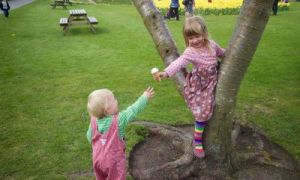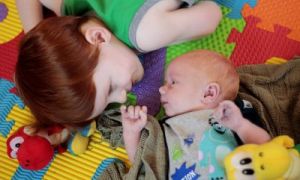Babies will spend most of their time watching the world around them, taking in information, getting directly involved and often combining both touch and sight which is often referred to as fine motor development.
Fine Motor Development Milestones
From 12 to 18 months
Babies are able to do much more for themselves during this stage. They have improved attention span which enables them to cope with more challenging fine motor activities. At times a baby will concentrate while performing a certain task as they try to complete the activity.
Milestones Achieved
- is able to hold two items in each hand at the same time
- enjoys making marks on paper with crayons or pencils
- hits pegs into a peg board with a hammer
- puts hands up when putting on a jumper/top to wear
- likes playing with moving objects
- enjoys making marks on paper with crayons or pencils
- starts to feed self with hands and a spoon
- hand preference may become apparent
- claps hands together
- is able to see a connection between hand movements and the effect this causes
- scribbles spontaneously
- scribbles with pencil or crayon held in fist
- turns over container to pour out contents
- tries to use spoon/fork
From 18 to 24 months
A baby's increased confidence will enable them to try harder games and puzzles. Towards the end of this stage, babies will have a growing curiosity about children of their age. Though they may not yet play co-operatively, babies will be watching closely how others interact. This will enable them to play with toys and games that they weren't interested in before.
Milestones Achieved
- enjoys manipulating play dough, clay, sand and water
- makes shapes and drawing “pictures” on paper
- likes rolling, throwing, catching balls both large and small
- stacks small wooden blocks on top of each other to make a tower
- pours water from a container
- enjoys looking at books
- studies pictures that or interest and begins to turn pages
- participates in dressing and undressing of themselves
- combines index finger and thumb in a pincer grip to pick up small objects
- is able to feed self with a spoon
- makes rhythmic sounds with simple musical instruments such as drums and shakers
- builds tower of four blocks or more
- turns pages of book, two or three pages at a time
- finger feeds efficiently
Babies will develop through curiosity and concentration, when they are provided plenty of opportunities to complete fine motor tasks. This will enable a baby the confidence to strengthen their new learnt skills.


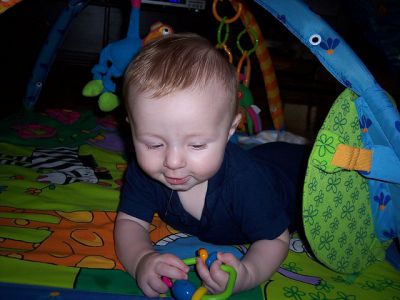
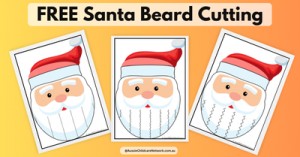
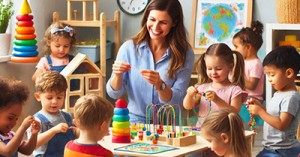
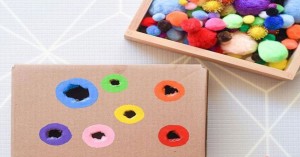
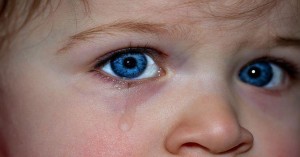
 Toddlers have a greater understanding of the world around them by this stage. Their cognitive development (also known as intellectual development and thinking skills) continues
Toddlers have a greater understanding of the world around them by this stage. Their cognitive development (also known as intellectual development and thinking skills) continues Infants begin to develop trust when parents begin to fulfil their needs. Such as changing an infant's nappy when needed, feeding on request and holding
Infants begin to develop trust when parents begin to fulfil their needs. Such as changing an infant's nappy when needed, feeding on request and holding Beginning at birth the construction of thought processes, such as memory, problem solving, exploration of objects etc, is an important part of an infant’s cognitive
Beginning at birth the construction of thought processes, such as memory, problem solving, exploration of objects etc, is an important part of an infant’s cognitive Toddlers want to do more on their own and do not like it when you begin to establish limits on their behaviour. Tantrums can become
Toddlers want to do more on their own and do not like it when you begin to establish limits on their behaviour. Tantrums can become Your preschooler is now able to focus their attention more accurately and is less influenced by distractions. The intensity of questions increase as your child
Your preschooler is now able to focus their attention more accurately and is less influenced by distractions. The intensity of questions increase as your child John Dewey is often seen as the proponent of learning by doing – rather than learning by passively receiving. He believed that each child was active,
John Dewey is often seen as the proponent of learning by doing – rather than learning by passively receiving. He believed that each child was active, Toddler advance and gains new skills in Gross Motor Development milestones achieved throughout earlier years. Co-ordination and challenges that could not be performed before such
Toddler advance and gains new skills in Gross Motor Development milestones achieved throughout earlier years. Co-ordination and challenges that could not be performed before such Erik Erikson developed a psychosocial theory to understand how we each develop our identities through eight stages of psychosocial development from infancy to adulthood. The
Erik Erikson developed a psychosocial theory to understand how we each develop our identities through eight stages of psychosocial development from infancy to adulthood. The At this point preschoolers begin to interact effectively with others. Play becomes more innovative and organized and “boyfriend” or “girlfriend” begins to emerge. Preschoolers have
At this point preschoolers begin to interact effectively with others. Play becomes more innovative and organized and “boyfriend” or “girlfriend” begins to emerge. Preschoolers have From now, babies begin to identify and respond to their own feelings, understanding other's feelings & needs and interact positively with others. A baby's social and
From now, babies begin to identify and respond to their own feelings, understanding other's feelings & needs and interact positively with others. A baby's social and
